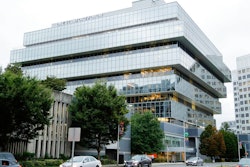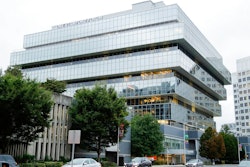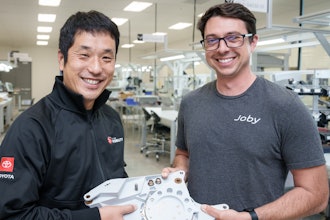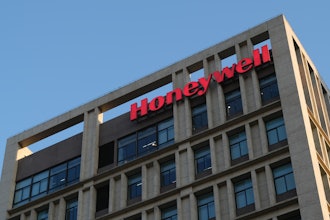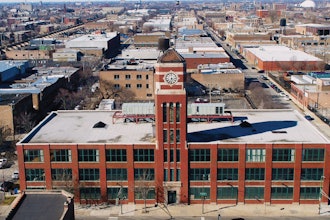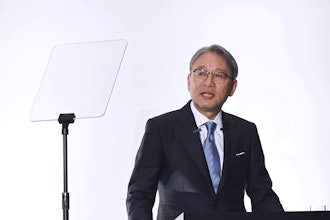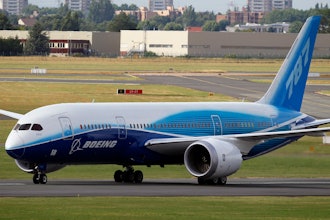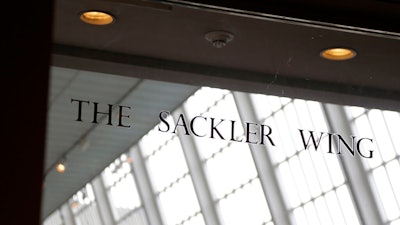
For a family with its name on a wing of one of the world's most famous museums and a school at a prestigious university, members of the Sackler clan have done a remarkable job of vanishing from public life.
The family owns OxyContin maker Purdue Pharma, which filed for bankruptcy this week as part of an effort to settle some 2,600 lawsuits accusing it of helping spark the national opioid crisis that has killed more than 400,000 people in the U.S. in the last two decades.
Any settlement deal is likely to take a cut of their future income, and some states have sought to go after the Sacklers' wealth, much of which has moved through a complex chain of companies and trusts in offshore tax havens. In a filing Wednesday, Purdue asked a bankruptcy court to halt all litigation against family members as well as the company.
The relatives have rarely spoken publicly in recent years and did not show up to the first bankruptcy hearing this week, in White Plains, New York. Here are some basic facts about the family:
THE COMPANY OWNERSHIP
Brothers Mortimer, Raymond and Arthur Sackler — all physicians — bought the drug company known as Purdue Frederick in 1952. They are all dead, but the widows, children and grandchildren of Mortimer and Raymond now own the company, along with an international drug company, Mundipharma.
Purdue is privately held, and its board has been mainly controlled by Sackler heirs over the years, until legal issues began piling up in the last year. No family members are currently on the board.
In court filings, lawyers for family members have argued that their clients, serving as company directors, were not heavily involved in day-to-day decisions at the company.
___
THE FAMILY BRANCHES: ARTHUR SACKLER
Arthur Sackler became a force in the drug industry separate from Purdue. In addition to his medical background, he worked in advertising and designed campaigns aimed at doctors for blockbuster drugs such as Valium.
In 1997, Sackler was posthumously placed in the Medical Advertising Hall of Fame, where the citation about him says that he "helped shape pharmaceutical promotion as we know it today."
But Arthur Sackler died years before OxyContin hit the market. And states that have filed lawsuits against members of the family have not named his heirs. Arthur Sackler's widow, Jillian Sackler, a major donor, has told institutions that her husband's money did not come from OxyContin.
"Suggestions that his philanthropy is now somehow tainted are simply false," she wrote earlier this year in a Washington Post opinion piece.
___
THE FAMILY BRANCHES: RAYMOND SACKLER
Raymond Sackler's son Richard, who now lives in Florida, was an executive at Purdue when OxyContin launched in 1996 and later became CEO of the company.
Plaintiffs in the lawsuits have seized on his words, especially his remarks to the company sales force at a 1996 launch party for OxyContin held just after a major snowstorm. He said the launch of the tablets would "be followed by a blizzard of prescriptions that will bury the competition. The prescription blizzard will be so deep, dense and white."
The drug did become a blockbuster, though generic opioids were prescribed far more often. Still, state and local governments that are suing the company assert that marketing by Purdue opened the door to wider use of prescription opioids.
Richard Sackler wrote in a 1999 email cited in court filings, "You won't believe how committed I am to make OxyContin a huge success. It is almost that I dedicated my life to it."
In a 2015 deposition, he tried to estimate how much the family had made from OxyContin. He said it was over $1 billion but less than $10 billion. In a video of the deposition that emerged in August, he was asked if he believed OxyContin was marketed too aggressively. He answered with a single word — "no" — while barely glancing up from papers he was looking through.
Representatives for Raymond Sackler's branch of the family did not respond to interview requests.
___
THE FAMILY BRANCHES: MORTIMER SACKLER
At the end of his life, Mortimer Sackler lived in London. His widow, Theresa, who lives in England, and children Mortimer D.A. Sackler, Kathe Sackler and Ilene Sackler Lefcourt are all former board members and are named in lawsuits.
Mortimer D.A. Sackler and Kathe Sackler were also Purdue executives.
In an April 1 deposition, Kathe Sackler was asked about an email attributed to her that concluded, "PS, I will strenuously protest approval of any document that suggests or implies, as this draft does, that Richard Sackler was responsible for the idea of developing a controlled-release oxycodone product. As you know, when I told Richard of my idea in the mid '80s, he asked me what oxycodone was."
In questioning under oath, though, she said she did not remember writing that and that it would have been uncharacteristic of her to do so.
Representatives Mortimer Sackler's branch of the family did not respond to interview requests.
___
THE MONEY
In 2016, Forbes magazine listed the Sacklers as one of the 20 wealthiest families in the U.S. and tallied their holdings at $13 billion.
For decades, the family members have been major philanthropic donors. In the 1970s, they underwrote the Metropolitan Museum of Art wing that houses an ancient Egyptian temple and bears the Sackler name.
This year, institutions including the Met, Britain's Tate museums, New York's Guggenheim and Tufts University, where the graduate school of biomedical sciences also bears the family's name, have announced they will stop taking gifts from the family or re-evaluate the relationship. The Louvre Museum in Paris took the Sackler name off a wing.
In legal filings, states have contended that the heirs of Mortimer and Raymond Sackler have accepted payments of at least $4 billion over the last dozen years.
Arizona's attorney general has asked the U.S. Supreme Court to force the family to return some money to Purdue so it could be fair game in lawsuits against the company. New York's attorney general has requested financial records of entities connected to the family to try to trace the money. Her office said in a legal filing this month that it found $1 billion transferred to the family through Swiss banks and other secret accounts.
___
THE YOUNGER GENERATION
The major exception to the Sackler family's silence in recent years came when Richard Sackler's son David and David's wife, Joss, both in their 30s, both gave interviews for magazine profiles published earlier this year.
Joss Sackler has a doctorate in linguistics, serves as a rock climbing guide and has a fashion line. In a Town & Country interview, she expressed frustration with media attention on her connection to the Sacklers rather than her own work. More recently, she feuded about OxyContin with rock star Courtney Love, who said in an Instagram post this month directed at Joss Sackler, "Your. People. Killed. My. People."
David Sackler, a Princeton University graduate who runs a family investment firm, made headlines last year when it was reported that he had paid $22.5 million in cash for a mansion in Los Angeles' Bel Air neighborhood. He told Vanity Fair that the family has been vilified in part because family members have not told their story publicly.
"We have not done a good job of talking about this," he said. "That's what I regret the most."
___




